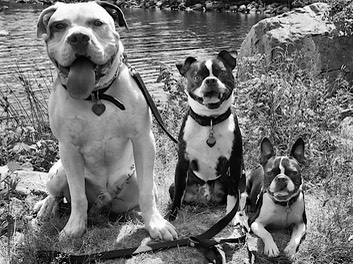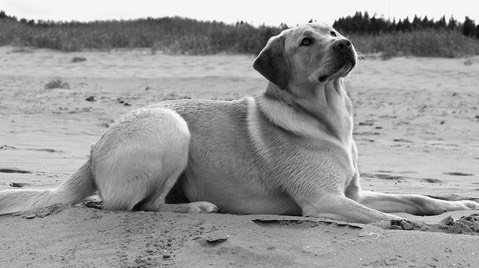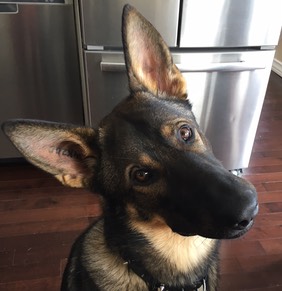
It always amazes me that people still buy into the myths and fallacies of dog training.
This is way too prevalent on line.
Having a problem, post to a site and everybody is an expert.
A recent poster to a message board I read posted: "my puppy is biting me, how can I make him stop”
She received all kinds of feedback ranging from the helpful to the inane.
Sadly there were many comments such as;
“pin your dog, he is trying to be alpha”
“your dog is being dominant, nip this is the butt and show him who is boss”
”grab him by the scruff and in a firm deep voice say NO.."
It makes those who know different, cringe.
I say, “those who know different” because science has shown us different. Please people, do not buy into the hype. Your puppy is not trying to dominate you. You do not need to respond with a heavy hand. If you do, the potential pitfalls that this entails increase exponentially.

What you have to do is show him differently.
For that, one can read the numerous books, blogs and articles from the last couple of decades. There is nothing wrong with this. Pick out the good ones. Those from knowledgable people. I highly encourage students of mine to read anything by Dr. Ian Dunbar, Jean Donaldson and Dr. Pamela Snow, just to name a few. You will be glad you did.
However, and this is where my inner psychology/academia geek emerges, I love returning to the basics. The originators of behaviour and learning theory…B.F. Skinner, Ivan Pavlov and John Watson had it right. They showed us different.
For those who are unfamiliar with the work of Skinner, he was a Harvard educated psychologist and behaviourist. He is considered the founding father of operant conditioning. Skinner is both heralded and criticized for his work. He is heralded for his research into operant conditioning but criticized for trying to generalize the findings of his research, done extensively on animals, to the human psyche. However, since we are discussing dog psychology and not human, we are still on solid ground. The work that he and his peers did is quite fascinating. It is still influencing modern psychology practices today in many important areas such as ABA (Applied Behavioural Analysis) Theory.
I will not bore you with the details but basically what Skinner said is that behaviour is a learned response. You can increase or decrease the occurrence of a particular behaviour by giving the subject feedback. If the subject enjoys the response, the behaviour is more likely to be repeated (positive reinforcement). If the subject gets no response (neutral reinforcement) or gets a negative response, the behaviour likely decreases or is extinguished. Think about it. It is a simple concept.

Skinner’s research has stood the test of time. It has been accepted, promoted and refined by experts throughout the world. It is simple and easy to understand.
So why is it that pseudo science like alpha theory, why is dominance rhetoric so prevalent in the dog community?
Even after the guy who is given the most credit for the research in which these types of principles are based on, L. David Mech, admitted his research was flawed and the conclusions drawn could not and should not be generalized to any wolf population much less dogs, alpha theory is accepted.
Why?
My theory is that we humans find the later easier to accept than the former. The later takes away personal responsibility and feelings of guilt from the owners and places it squarely on the dog’s shoulders.
I mean, it is much easier for us humans to accept that our dogs are jumping on us because they are trying to be dominant than it is to accept the blame that we have encouraged our dogs to jump on us from a very young age by rewarding them for doing so.
It is a relief to believe that our dogs are chewing on furniture when we are gone because they are trying to get back at us for leaving them alone as opposed to realizing that the dogs are under-stimulated and trying to relieve boredom because we are not spending enough quality time with them.
If our dogs are aggressive, it is much easier to re-home them if we believe they are trying to be “ alpha"as opposed to accepting that we under socialized or poorly socialized them as puppies.
If we humans believe that our dog’s behaviours are the result of some imagined pack structure where he is always fighting to become top dog as opposed to accepting that we have taught our dog to behave rudely, our guilt is nonexistent.
Unfortunately the downside of this is that it also alleviates our guilt to the responses to the issues.
Responses like alpha rolls, pinning a dog, showing your dog who is boss are very outdated and unfortunate. They are based on research that should never have been generalized to the dog population.
Let me be clear here, these responses can work or at least appear to work however, they have an even greater potential to backfire and cause other even larger problems. I have seen perfectly good dogs re-homed, given away and euthanized as a result of these methods. Using them is a very slippery slope. If there are other, less intrusive ways, which minimize the potential of backfiring...why not use them? They may take more work, more consistency and a greater self awareness but the pay off is significantly better.
So what is one to do if you have a “problem dog”?

The best first step is to ask yourself, “what am I doing that is contributing to the issue?”.
Realistically examine it. Be brutal with yourself.
Most times you can identify what you are doing that is contributing to a behaviour. Do yourself a favor, forget about pack theory, ignore being an alpha, forget about the energy you are exuding. Look at it simply and logically.
Look at the ABCs of behaviour where A is the antecedent, B is the behaviour and C is the consequence (for more on that read THE ABCS OF DOG TRAINING). Once you have identified what is happening, start manipulating the antecedent and the consequence part of the equation and the behaviour part will change.
Try it out.
If you give it a shot and are still having issues, consult with a quality professional. This will save a lot of frustration and heartache. It will make for a much happier relationship between you and your dog.

I teach a great course called the “My Dog is Awesome” course. In the course, I have the owners examine the ABCs of dog behaviour, start manipulating the same in order to shape and modify behaviour. When I see students getting it, it is amazing the changes that happen in the dogs.
The dogs are so much happier. They are giving more eye contact and having a lot of fun with their owners. The dogs start taking more cues, start checking in with their owners more. They walk around the room so proud.
Why?
Because they are confident. The lines of communication are wide open and they finally understand what they are being asked.
It is a beautiful thing!!!